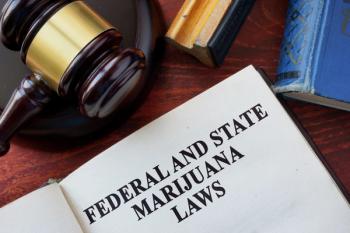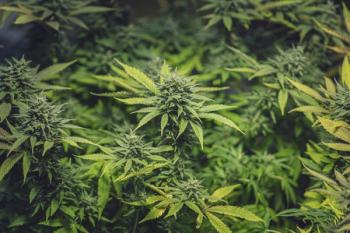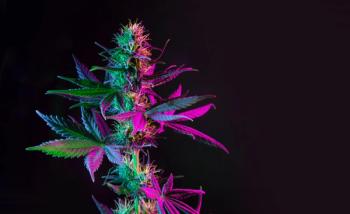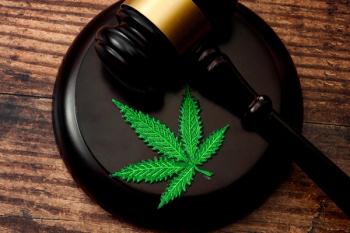
- Drug Topics September 2022
- Volume 166
- Issue 9
CBD Products: What Pharmacists Need to Know
CBD products range from gummies to tinctures to topical lotions and creams.
Although Jenna Carmichael, PharmD, advises each pharmacist to look into the legal implications of selling CBD products in the state where they practice, CBD, or Cannabidiol, is legal on a federal level following the passage of The Agriculture Improvement Act of 2018, or the 2018 Farm Bill.1 Carmichael is a holistic oncology pharmacist at Clarks Summit, Pennsylvania-based Wobbly Arrow Wellness.
If a product has a maximum of 0.3% tetrahydrocannabinol (THC), it is legal because it’s mostly CBD, and Carmichael suspects that is the reason why CBD products are being sold at gas stations, online, and in local pharmacies. THC is the compound that produces the “high” that’s often associated with marijuana.2
Just as important as demystifying CBD products for patients is “demythifying” them, said David Kroll, PhD, a professor in the department of pharmaceutical sciences at the University of Colorado Anschutz Medical Campus in Aurora.
One area with a need for education and awareness is around the conditions where CBD is approved by FDA as a treatment. CBD has been approved by FDA to treat children with rare childhood epilepsy syndromes where they may be debilitated by experiencing as many as tens of dozens of seizures each day, said Kroll.
In 2018, Epidiolex (cannabidiol) was approved by FDA for the treatment of seizures associated with two rare and severe forms of epilepsy, Lennox-Gastaut syndrome and Dravet syndrome, in patients 2 years of age and older.3
With Lennox-Gastaut syndrome, patients can experience tonic seizures where the body stiffens, the eyes gaze upward, the pupils become dilated, and patients experience altered breathing patterns; often, periods of frequent seizures are mixed with relatively seizure-free periods.4 Seizures are often triggered by high temperatures with Dravet syndrome, where patients may experience loss of motor skills, intellectual disability, speech impairment, and difficulty with movement.5
Here’s what pharmacists need to know about 4 different CBD products:
Topicals
There is some disagreement among pharmacists and other experts on the effectiveness of topical CBD products. According to Carmichael, topicals can be a great way for patients to “put the relief right where they need it.” They can be used in a similar way as muscle rubs, she added. “[The patient] will get that local relief, right where [they] need it, [such as] on the knee or the hip, but it’s not going to be systemically absorbed.”
Still, as with any other treatment, it’s important to tell patients about potential drug interactions, Carmichael, who’s also an adjunct faculty member at Wilkes University’s Nesbitt School of Pharmacy in Wilkes-Barre, Pennsylvania, advised. For example, warfarin (Coumadin), which can be used to prevent blood clots from forming or growing larger, is one drug that could interact with a topical CBD product.
The hypothesis is that CBD product’s anti-inflammatory effects might be useful for a topical product for knee or back pain, Kroll explained. Still, the concentration of CBD in these products is unlikely to have a biologic effect in joints and through the skin.
Tim Gregorius, RPh, vice president of operations at Latrobe, Pennsylvania–based consulting firm PRS Pharmacy Services, typically advises pharmacists that the FDA hasn’t approved of CBD products to treat most conditions. While he admitted this can be a murky area for pharmacists, a topical cream can be a good place to start.
“[If] somebody comes in and says, ‘My knees hurt, my elbow hurts, my neck hurts,’ we can put them on a topical cream immediately. Most of the time, people come back in a day and say, ‘My goodness, I haven’t been pain-free like that for years.’”
Gummies
“They’re discrete…and you don’t have to smoke them,” said Carmichael, observing the reason gummies are popular among patients. Still, patients often have the misconception that gummies are a “lighter" version of CBD, she said. “The problem with gummies is there’s a delay. You have to absorb the CBD, and it has to be activated by the liver. That takes time.”
Typically, it can take between 60 and 90 minutes, dependent on a person’s metabolism, for the gummy to kick in and deliver “the relief they’re looking for,” Carmichael noted. Some patients will take a second gummy before feeling the first gummy’s effect, which she counsels against. “Wait at least 2 hours,” Carmichael advised.
Patients who have had gastric bypass surgery have different gastric absorption than most people, said Carmichael; some of these patients say they can take “boatloads of gummies” and they have no effect, while others say gummies can take many hours to kick in. In addition, elderly patients or any patient with an unstable heart condition should be careful, according to Carmichael. The effect of CBD may stretch 6 to 8 hours, which could lead to stress or anxiety; the related anxiety could cause a heart attack, not the CBD, she said.
Tinctures
These products are oil extracts, Carmichael explained. It is common to find almond and coconut oils used with CBD. Tinctures are often used with children, she explained.
The ability to individualize the dose with a dropper is a benefit of tinctures, said Carmichael. She typically recommends tincture products to patients who want to be able to escalate or reduce the dose while avoiding the need to return for a new strength of a CBD product.
Delta-8
Although delta-8 is similar to delta-9 THC, it is not quite as psychoactive, according to Carmichael, since delta-8 is derived from hemp and not from medical cannabis. One thing Carmichael has learned about the use of delta-8 is that people will simply take more to get the level of effect expected with delta-9 THC.
“That can be problematic,” she said. ”These products are being vaped and these products are easy to conceal, so it’s easy for people to get their hands on [them].
Across all CBD products, Kroll advises pharmacists to conduct due diligence to ensure that the products meet quality standards. “It’s pretty much left to the manufacturers in most states," he said. "And even at the federal level, the FDA still hasn’t come out with strong guidance with CBD products."
References
1. The Agriculture Improvement Act of 2018 (2018 Farm Bill). H.R.2. 115th Congress (2017-2018).Accessed August 25, 2022.
2. FDA and cannabis: Research and drug approval process. FDA. Reviewed October 1, 2020. Accessed August 25, 2022.
3. FDA-approved drug Epidiolex placed in Schedule V of Controlled Substance Act. United States Drug Enforcement Administration. Published September 27, 2018. Accessed August 25, 2022.
4. Lennox-Gastaut Syndrome. National Institute of Neurological Disorders and Stroke, National Institutes of Health. Reviewed July 25, 2022. Accessed August 25, 2022.
5. Dravet syndrome. National Center for Advancing Translational Sciences, National Institutes of Health. Updated November 8, 2021. Accessed August 25, 2022.
Articles in this issue
over 3 years ago
Tips for Managing Diabetes Comorbiditiesover 3 years ago
The Evolution of the CBD Regulatory Landscapeover 3 years ago
Women and CBD: Increased Interest, but Caution Is Warrantedover 3 years ago
Mitigating Costs of Cancer Treatment: The Role of Pharmacistsover 3 years ago
Counseling Pearls for CBDover 3 years ago
Drug Testing Challenges Emerge With CBD Product Useover 3 years ago
Waste Problem Shows COVID-19 Vaccines Aren’t Just a Dime a DozenNewsletter
Pharmacy practice is always changing. Stay ahead of the curve with the Drug Topics newsletter and get the latest drug information, industry trends, and patient care tips.























